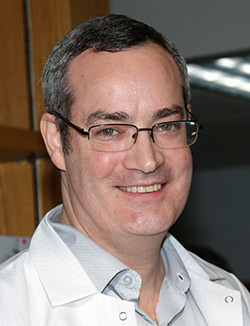 Dr. Steven DeeksVery soon after an initial HIV infection, regardless of how it was acquired, HIV homes in on T cells in the gut. It establishes a latent HIV reservoir and, within days, disrupts the normal barrier between intestinal bacteria and the blood. These changes promote a state of chronic inflammation, which in turn fosters HIV growth and spread, and may accelerate disorders associated with aging of the heart, kidney and bone. Antiretroviral therapy (ART) may diminish, but does not stop, these processes.
Dr. Steven DeeksVery soon after an initial HIV infection, regardless of how it was acquired, HIV homes in on T cells in the gut. It establishes a latent HIV reservoir and, within days, disrupts the normal barrier between intestinal bacteria and the blood. These changes promote a state of chronic inflammation, which in turn fosters HIV growth and spread, and may accelerate disorders associated with aging of the heart, kidney and bone. Antiretroviral therapy (ART) may diminish, but does not stop, these processes.
Writing in the March issue of the online journal PLoS Pathogens, Drs. Steven Deeks, Peter Hunt and associates from the amfAR Institute for HIV Cure Research at the University of California, San Francisco, and The Wistar Institute in Philadelphia, discovered a new link in this chain of events that may hold the key to promoting intestinal recovery in such individuals.
Using gut biopsies obtained from infected people taking ART, Deeks, Hunt and colleagues found higher levels of A20, a protein associated with reduced inflammation. In the gut biopsies of people not taking ART, on the other hand, A20 levels were reduced. The increase in A20 in those on ART was associated with an increase in three intestinal proteins that support healthy barrier functions of the gut.
 Dr. Peter HuntBut the link between A20 and gut integrity proved to be complex. Using a mouse model of the intestines—an “intestinoid” grown from gut cells in the test tube—they showed that A20 is critical for survival of those cells. But during untreated infection, A20 is suppressed by one element of the immune system’s response to the virus, namely interferon-alpha. The research team confirmed the link between interferon-alpha and A20 by studying the blood cells of HIV-infected individuals on ART who received additional treatment with interferon-alpha.
Dr. Peter HuntBut the link between A20 and gut integrity proved to be complex. Using a mouse model of the intestines—an “intestinoid” grown from gut cells in the test tube—they showed that A20 is critical for survival of those cells. But during untreated infection, A20 is suppressed by one element of the immune system’s response to the virus, namely interferon-alpha. The research team confirmed the link between interferon-alpha and A20 by studying the blood cells of HIV-infected individuals on ART who received additional treatment with interferon-alpha.
Simply put, HIV infection increases the activity of interferon-alpha, which decreases A20 and thus causes harm. Conversely, antiretroviral therapy increases levels of A20, preventing the damage that would otherwise be done to cells in the gut.
The researchers concluded that “variation in A20 expression during the course of HIV infection could underlie both the development of [intestinal] epithelial dysfunction before the initiation of ART and the recovery of intestinal epithelial integrity thereafter…. Further studies are warranted.” Clearly they are, as this may be yet another part of the search for an HIV cure.
Dr. Laurence is amfAR’s senior scientific consultant.